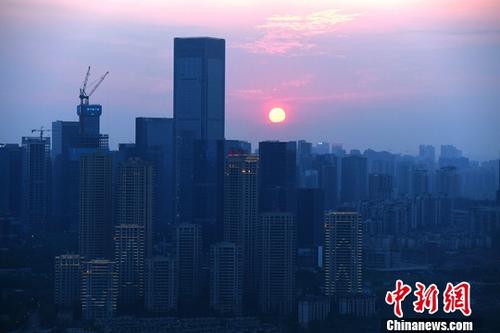The data picture shows the high-rise buildings in Chongqing.
Photo by China News Agency reporter Chen Chao
China News Service, Beijing, May 27 (Reporter Pang Wuji) Many key cities in China have completed the first batch of commercial residential land transfers for "centralized announcements and centralized supply" (referred to as "two centralizations") this year.
Statistics released by Centaline Real Estate Research Center on the 27th showed that as of May 26, 15 cities in China, including Beijing, Tianjin, Shenyang, Changchun, and Shenzhen, had completed the first batch of centralized land supply this year.
The first batch of land transactions in 15 cities reached 715.8 billion yuan (RMB, the same below).
Under the influence of the policy of centralized land supply, land supply has increased in volume.
According to statistics, the starting price of the first batch of land parcels in 15 cities has exceeded 700 billion yuan. Among them, the total starting price of Beijing exceeds 100 billion yuan, and that of Hangzhou and Guangzhou exceeds 90 billion yuan.
The land market in some cities is very hot.
Among the 15 cities, the average premium rates of the first batch of centralized land transactions in Chongqing and Shenzhen reached 38.82% and 30.9%, respectively.
In addition, the average premium rate in the three cities of Xiamen, Hangzhou and Ningbo exceeds 20%.
In contrast, Beijing, Changchun, and Qingdao have relatively low average premium rates, all below 7%, and the land market is relatively stable.
Zhang Dawei, chief analyst of Centaline Property, pointed out that from the perspective of the first batch of centralized land supply, the land market in hot cities has not cooled significantly.
The average premium rate of the first batch of centralized land transactions in 15 cities was 17.26%, which was 5 percentage points higher than the average premium rate of 22 key cities in the same period last year.
A report issued by the Zhongzhi Research Institute also showed that the land market has become more heated in April.
The report shows that in April, the average floor price of residential land transactions in 300 cities in China reached 6,317 yuan per square meter, breaking the 6,000 yuan per square meter mark for the first time. The premium rate of residential land transactions was 27.3%, setting a new high for the average premium rate in 300 cities. The overall land market is relatively hot.
For real estate companies, Zhang Dawei believes that companies with strong capital will get more opportunities to obtain land, while companies with high capital pressure may face greater pressure, corporate differentiation will further intensify, and profit margins will be significantly reduced.
In addition, Mo Tianquan, Dean of the Zhongzhi Research Institute, pointed out in an interview with a reporter from China News Agency that under the policy of “two centralizations” of land supply, some real estate companies have begun to move to hotspot third- and fourth-tier cities. The land market in third- and fourth-tier cities is heating up, driving up their housing prices.
The heat of the real estate market has a certain degree of conduction and rotation.
However, Mo Tianquan said that some of the current regulatory overweight cities have shown signs of slowing growth or scaling back in market transaction volume. With the further manifestation of the regulatory effects, the property market is expected to operate more smoothly. (Finish)

